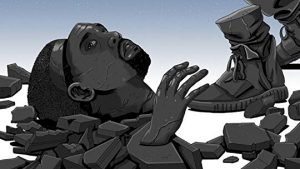Ta-Nehisi Coates in his blog:
 Jackson cranked up “Billie Jean” and I felt it too. For when I saw Michael Jackson glide across the stage that night at Madison Square Garden, mere days before the Twin Towers fell, I did not imagine him so much walking on the moon, as walking on water. And the moonwalk was the least of things. He whipped his mop of hair and, cuffing the mic, stomped with the drums, spun, grabbed the air. I was astounded. There was the matter of his face, which took me back to the self-hatred of the ’80s, but this seemed not to matter because I was watching a miracle—a man had been born to a people who controlled absolutely nothing, and yet had achieved absolute control over the thing that always mattered most—his body.
Jackson cranked up “Billie Jean” and I felt it too. For when I saw Michael Jackson glide across the stage that night at Madison Square Garden, mere days before the Twin Towers fell, I did not imagine him so much walking on the moon, as walking on water. And the moonwalk was the least of things. He whipped his mop of hair and, cuffing the mic, stomped with the drums, spun, grabbed the air. I was astounded. There was the matter of his face, which took me back to the self-hatred of the ’80s, but this seemed not to matter because I was watching a miracle—a man had been born to a people who controlled absolutely nothing, and yet had achieved absolute control over the thing that always mattered most—his body.
And then the song climaxed. He screamed and all the music fell away, save one solitary drum, and boneless Michael seemed to break away, until it was just him and that “Billie Jean” beat, carnal, ancestral. He rolled his shoulders, snaked to the ground, and then backed up, pop-locked, seemed to slow time itself, and I saw him pull away from his body, from the ravished face, which wanted to be white, and all that remained was the soul of him, the gift given onto him, carried in the drum.
I like to think I thought of Zora while watching Jackson. But if not, I am thinking of her now:
It was said, “He will serve us better if we bring him from Africa naked and thing-less.” So the bukra reasoned. They tore away his clothes so that Cuffy might bring nothing away, but Cuffy seized his drum and hid it in his skin under the skull bones. The shin-bones he bore openly, for he thought, “Who shall rob me of shin-bones when they see no drum?” So he laughed with cunning and said, “I, who am borne away, to become an orphan, carry my parents with me. For rhythm is she not my mother, and Drama is her man?” So he groaned aloud in the ships and hid his drum and laughed.
There is no separating the laughter from the groans, the drum from the slave ships, the tearing away of clothes, the being borne away, from the cunning need to hide all that made you human. And this is why the gift of black music, of black art, is unlike any other in America, because it is not simply a matter of singular talent, or even of tradition, or lineage, but of something more grand and monstrous. When Jackson sang and danced, when West samples or rhymes, they are tapping into a power formed under all the killing, all the beatings, all the rape and plunder that made America. The gift can never wholly belong to a singular artist, free of expectation and scrutiny, because the gift is no more solely theirs than the suffering that produced it.
More here. (Note: Throughout February, we will publish at least one post dedicated to Black History Month)
